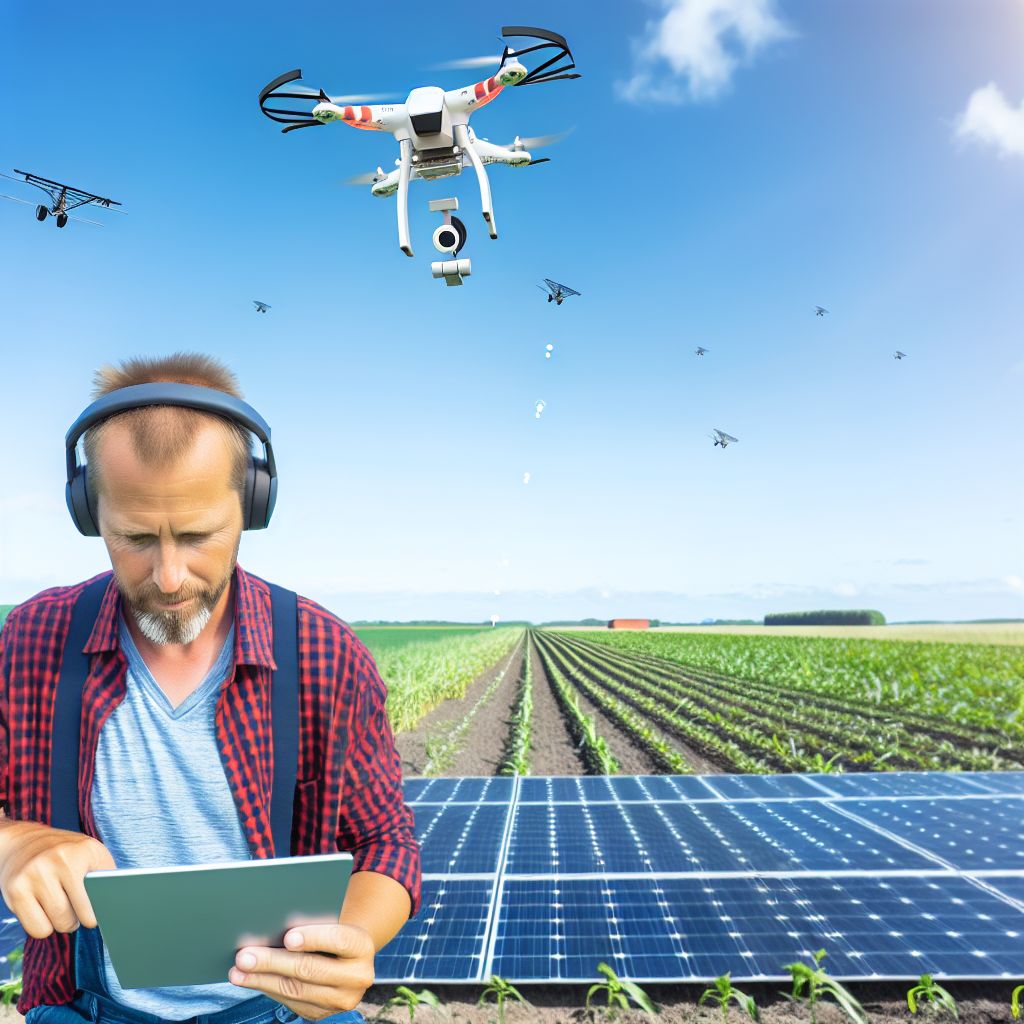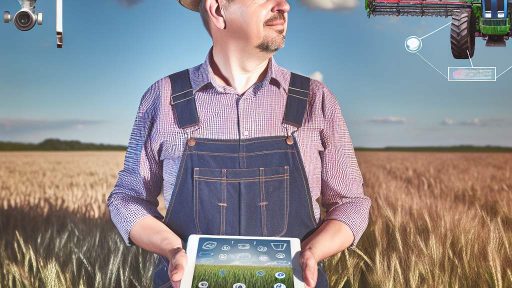Introduction to Agri-Fintech
Definition and Importance
Agri-fintech combines agriculture and financial technology.
This innovative sector significantly impacts modern farming practices.
It offers solutions to the unique challenges faced by farmers.
These solutions enhance productivity and profitability.
Understanding Agri-Fintech Solutions
Agri-fintech solutions streamline various farming processes.
They provide access to capital through digital platforms.
This access enables farmers to invest in modern equipment.
Furthermore, it allows them to scale their operations.
Benefits of Agri-Fintech
One major benefit is improved financial management.
Farmers can track expenses and revenue easily.
Additionally, these solutions help in credit assessment.
Farmers gain insights into their financial health.
Moreover, agri-fintech fosters transparency in transactions.
Challenges Addressed by Agri-Fintech
Agri-fintech addresses several challenges in agriculture.
Access to financing is a primary issue.
Transform Your Agribusiness
Unlock your farm's potential with expert advice tailored to your needs. Get actionable steps that drive real results.
Get StartedTraditional banks often overlook small-scale farmers.
By using technology, agri-fintech opens new funding avenues.
This inclusion empowers farmers and stimulates growth.
Examples of Successful Agri-Fintech Implementation
Several companies exemplify successful agri-fintech implementation.
FintechFarm has revolutionized loan applications for farmers.
Their platform uses AI to predict repayment ability.
CropFinance offers tailored financing based on crop yield predictions.
These innovative solutions help farmers thrive in competitive markets.
Overview of Traditional Farming Practices and Their Limitations
Reliance on Manual Labor
Traditional farming heavily relies on manual labor for crop production.
This approach can be physically demanding and time-consuming.
Farmers often face difficulties in finding enough labor to meet seasonal demands.
As a result, crop yields may suffer due to labor shortages.
Inconsistent Crop Yields
Many traditional practices lead to inconsistent crop yields.
Factors such as weather and soil conditions greatly influence production outcomes.
In addition, pest infestations can devastate entire harvests.
This inconsistency makes it hard for farmers to predict income.
Limited Access to Technology
Farmers often lack access to modern agricultural technologies.
This limits their ability to optimize farming practices and increase efficiency.
Consequently, yield potentials are often left untapped.
Moreover, many farmers may not possess the skills to utilize available technology.
Soil Degradation
Traditional methods often contribute to soil degradation over time.
Excessive tilling erodes topsoil and diminishes its fertility.
As a result, farmers must rely on chemical fertilizers to maintain yields.
This reliance can lead to adverse environmental impacts.
Showcase Your Farming Business
Publish your professional farming services profile on our blog for a one-time fee of $200 and reach a dedicated audience of farmers and agribusiness owners.
Publish Your ProfileFinancial Constraints
Many farmers struggle with financial constraints limiting their growth.
Access to credit and investment is often limited in rural areas.
This financial strain restricts farmers from early investments in resource conservation.
Thus, they are often unable to innovate or improve farming efficiency.
Key Agri-Fintech Solutions Transforming Farming
Financial Inclusion and Access to Capital
Agri-fintech solutions provide farmers with easier access to capital.
For instance, platforms like HarvestFinance offer micro-loans tailored for small farms.
This approach reduces reliance on traditional banking systems.
Moreover, farmers can secure funds quickly during planting seasons.
Consequently, these solutions empower farmers to invest in technology and equipment.
Precision Agriculture Tools
Precision agriculture tools enhance farming efficiency and productivity.
Solutions such as CropTech provide real-time data analytics on crop health.
Farmers can make informed decisions based on accurate soil and climate data.
Additionally, drones and sensors monitor crop conditions remotely.
As a result, farmers can optimize resource usage, reducing waste.
Market Access Platforms
Market access platforms connect farmers directly to consumers.
For example, FreshDirect allows farmers to sell produce online.
This direct-to-consumer model increases farmer profits significantly.
Such platforms also help eliminate middlemen, creating fairer pricing.
Insurance and Risk Management Solutions
Agri-fintech provides innovative insurance products for farmers.
Companies like AgriShield offer parametric insurance based on weather conditions.
Farmers receive payouts immediately after a defined weather event occurs.
Consequently, this protects them from financial losses due to crop failure.
As a bonus, risk management tools help farmers plan for future uncertainties.
Blockchain for Traceability and Transparency
Blockchain technology enhances traceability in the supply chain.
Solutions such as FoodChain enable transparent tracking of food products.
Consumers can verify the origin and safety of their food easily.
This increased transparency builds trust between farmers and consumers.
Additionally, it encourages sustainable farming practices.
Education and Training Resources
Agri-fintech platforms offer educational resources for farmers.
Online courses and webinars provide valuable farming knowledge and skills.
For instance, LearnAgri covers sustainable farming practices effectively.
Farmers can improve their strategies and adopt new technologies.
This ongoing education keeps them competitive in the evolving market.
Gain More Insights: How Biotechnology Is Transforming Modern Farming Practices
Impact of Data Analytics on Crop Management and Yield Prediction
Enhancing Decision-Making with Data
Data analytics provides farmers with actionable insights.
This approach improves decision-making processes significantly.
Farmers now leverage data to optimize resources effectively.
Access to accurate data empowers growers to make informed choices.
Real-Time Monitoring of Crop Health
Technologies allow for real-time monitoring of crops.
Farmers can detect issues quickly and respond accordingly.
Showcase Your Farming Business
Publish your professional farming services profile on our blog for a one-time fee of $200 and reach a dedicated audience of farmers and agribusiness owners.
Publish Your ProfileThis proactive strategy minimizes crop losses and boosts yields.
Yield Prediction Through Advanced Algorithms
Advanced algorithms analyze historical data for better yield predictions.
These predictions help farmers plan their planting strategies effectively.
As a result, farmers can allocate resources more efficiently.
Personalized Recommendations for Enhanced Growth
Data analytics facilitates personalized crop management recommendations.
Farmers receive tailored advice based on their specific conditions.
This precision agriculture approach fosters sustainable practices.
Integrating Weather Data for Optimal Outcomes
Weather data integration enhances the overall predictive capabilities.
Farmers can adapt their strategies according to weather forecasts.
This adaptability leads to improved crop resilience against climate impacts.
Fostering Collaboration Across the Supply Chain
Data analytics encourages collaborative efforts among stakeholders.
Farmers, suppliers, and exporters can share valuable information easily.
This collaboration streamlines operations and enhances profitability.
Find Out More: Solar Power Systems for Modern Agricultural Operations
Financial Inclusion for Farmers Through Mobile Banking and Credit Solutions
Enhancing Access to Financial Services
Agri-fintech solutions provide essential financial services to farmers.
These services include mobile banking, credit solutions, and insurance products.
Farmers can access funds easily through their mobile devices.
This accessibility empowers them to make timely investments in their crops.
Overcoming Traditional Barriers
Many farmers face challenges when approaching traditional banks.
These challenges often include high collateral requirements.
Additionally, lengthy paperwork can discourage potential borrowers.
Agri-fintech solutions streamline this process significantly.
Thus, farmers can secure loans with minimal documentation.
Promoting Financial Literacy
Financial literacy programs are crucial for successful adoption of these solutions.
Many agri-fintech companies offer educational resources to farmers.
These resources help farmers understand credit products and banking services.
Empowered with knowledge, farmers are better equipped to manage their finances.
Impact of Mobile Banking on Farming
Mobile banking technology enables quick transactions for farmers.
Farmers can receive payments directly and instantly for their products.
Consequently, this improves cash flow and reduces financial uncertainty.
Moreover, mobile banking allows for easier tracking of expenses and income.
Credit Solutions Tailored for Agriculture
Many fintech firms now offer credit solutions specifically designed for farming needs.
These solutions consider the seasonal nature of agricultural income.
Farmers can access loans that align with their cash flow cycle.
As a result, they can focus more on production rather than financial stress.
Long-term Financial Sustainability
Financial inclusion fosters long-term sustainability in agriculture.
It enhances farmers’ ability to invest in technology and innovation.
Additionally, it cultivates resilience against market fluctuations.
Farmers equipped with financial resources can adapt better to challenges.
Uncover the Details: Choosing The Right Crop Disease Detection Tools For Your Farming Needs
Showcase Your Farming Business
Publish your professional farming services profile on our blog for a one-time fee of $200 and reach a dedicated audience of farmers and agribusiness owners.
Publish Your Profile
Case Studies: Successful Implementation of Agri-Fintech Solutions
Transforming Smallholder Farming in Kenya
In Kenya, a startup named FarmConnect is leading a revolution in smallholder farming.
This platform provides farmers with access to crucial financial services.
FarmConnect uses mobile technology to facilitate transactions and provide loans.
Farmers can receive immediate feedback on their financial status.
This instant communication improves their decision-making significantly.
Additionally, farm yield has increased by more than 25% in the first year.
Farmers can now invest in better seeds and fertilizers without worry.
A recent survey shows that farmers feel more empowered than ever.
Enhancing Crop Production in India
KrishiTech, an agri-fintech firm in India, is empowering farmers with data analytics.
The company provides detailed weather forecasts and soil health data.
Farmers can use this information to optimize planting schedules.
As a result, crop production has increased by nearly 30% in several regions.
A farmer named Ravi Sharma reported that he understood his crop needs better.
He attributes better yields to the actionable insights provided by KrishiTech.
This approach minimizes resource wastage significantly.
Farmers now face fewer uncertainties than before.
Integration of Blockchain for Transparency
Agritech Solutions in Brazil is utilizing blockchain for enhanced traceability.
This ensures that consumers know the origin of their food products.
With this technology, farmers receive quicker payments from buyers.
The speed of transactions has been reduced by half since implementation.
Transparency in transactions builds trust among stakeholders.
Farmers like Maria Gomes feel more valued and secure in their trades.
This transparency attracts more investments into local agricultural sectors.
As a result, the overall financial landscape for farmers is improving.
Building Financial Resilience in South Africa
AgriFinance in South Africa provides tailored loans for agribusiness operations.
Through a partnership with local banks, they enhance financial accessibility.
Farmers are now able to access credit tailored to their unique needs.
This initiative has become vital for farmers affected by climate change.
A local farmer, Thabo Nkosi, successfully secured a loan for irrigation systems.
His crop yield doubled, allowing him to expand his business significantly.
Now, he employs seasonal workers, providing jobs in his community.
This model showcases how agri-fintech can boost resilience and growth.
Explore Further: How Automated Machinery Enhances Crop Yields
Sustainability and Environmental Benefits of Agri-Fintech Innovations
Enhancing Resource Efficiency
Agri-fintech solutions optimize the use of resources in farming.
They provide data-driven insights that improve decision-making.
As a result, farmers can significantly reduce water and fertilizer usage.
Furthermore, this approach minimizes waste and environmental impact.
Promoting Sustainable Practices
Innovations in agri-fintech encourage sustainable farming techniques.
For instance, precision agriculture improves crop management strategies.
These techniques help in minimizing pesticide and herbicide application.
Showcase Your Farming Business
Publish your professional farming services profile on our blog for a one-time fee of $200 and reach a dedicated audience of farmers and agribusiness owners.
Publish Your ProfileConsequently, farmers can maintain healthier ecosystems.
Supporting Renewable Energy Utilization
Many agri-fintech platforms support renewable energy integration.
These systems facilitate the use of solar and wind energy on farms.
By reducing reliance on fossil fuels, emissions decrease substantially.
As a result, farms can operate more sustainably and economically.
Facilitating Financial Viability
Agri-fintech enhances the financial stability of farming operations.
Access to microloans and funding through digital platforms is crucial.
More importantly, farmers can invest in eco-friendly technologies.
This leads to long-term sustainability and profitability.
Improving Supply Chain Transparency
Agri-fintech innovations increase visibility across the supply chain.
Title tracking systems provide critical information about produce origins.
This transparency ensures ethical and sustainable sourcing practices.
Furthermore, consumers are more likely to support eco-friendly products.
Encouraging Collaboration Among Stakeholders
These innovations foster collaboration between farmers and tech companies.
Farmers gain access to modern tools and knowledge for sustainable practices.
Moreover, partnerships lead to shared best practices and resources.
This collective effort significantly boosts the sector’s sustainability.
Future Trends in Agri-Fintech: AI, Blockchain, and IoT Integration
The Role of Artificial Intelligence
Artificial Intelligence is transforming farming practices significantly.
AI algorithms analyze vast amounts of data quickly.
This data helps farmers make informed decisions.
For instance, AI can predict crop yields more accurately.
Additionally, AI assists in optimizing resource use.
This reduces waste and enhances efficiency on farms.
Moreover, AI-driven tools offer tailored recommendations.
Farmers can then adopt best practices specific to their needs.
Blockchain’s Impact on Transparency
Blockchain technology enhances transparency in agriculture.
This technology allows for secure record-keeping.
Farmers can track the journey of products from farm to consumer.
This builds trust with customers by ensuring quality.
Moreover, blockchain minimizes food fraud significantly.
It provides verifiable proof of authenticity for products.
Additionally, blockchain facilitates smart contracts.
This streamlines transactions between buyers and sellers.
Internet of Things in Agriculture
The Internet of Things (IoT) connects various devices seamlessly.
Farmers use IoT sensors to monitor field conditions.
This includes soil moisture, temperature, and crop health.
Consequently, timely alerts help optimize irrigation practices.
Moreover, IoT devices collect real-time data for analysis.
This data informs crucial decisions to enhance productivity.
Furthermore, IoT can automate tasks, saving labor costs.
Showcase Your Farming Business
Publish your professional farming services profile on our blog for a one-time fee of $200 and reach a dedicated audience of farmers and agribusiness owners.
Publish Your ProfileIoT-enabled machinery improves operational efficiency overall.
Collaboration Among Technologies
The integration of AI, blockchain, and IoT presents immense potential.
These technologies work together to create smart farming solutions.
AI utilizes IoT data for predictive analytics.
Blockchain secures this data, ensuring its integrity.
As a result, farmers gain deeper insights and greater control.
This synergy drives innovation in farming practices.
Farmers can respond to challenges more effectively.
Consequently, they achieve higher levels of sustainability.
Additional Resources
The Crucial Role Of Agri-Fintech In Supporting Sustainable …
Integrating Agri-Fintech Technologies For Smarter Farm Management




